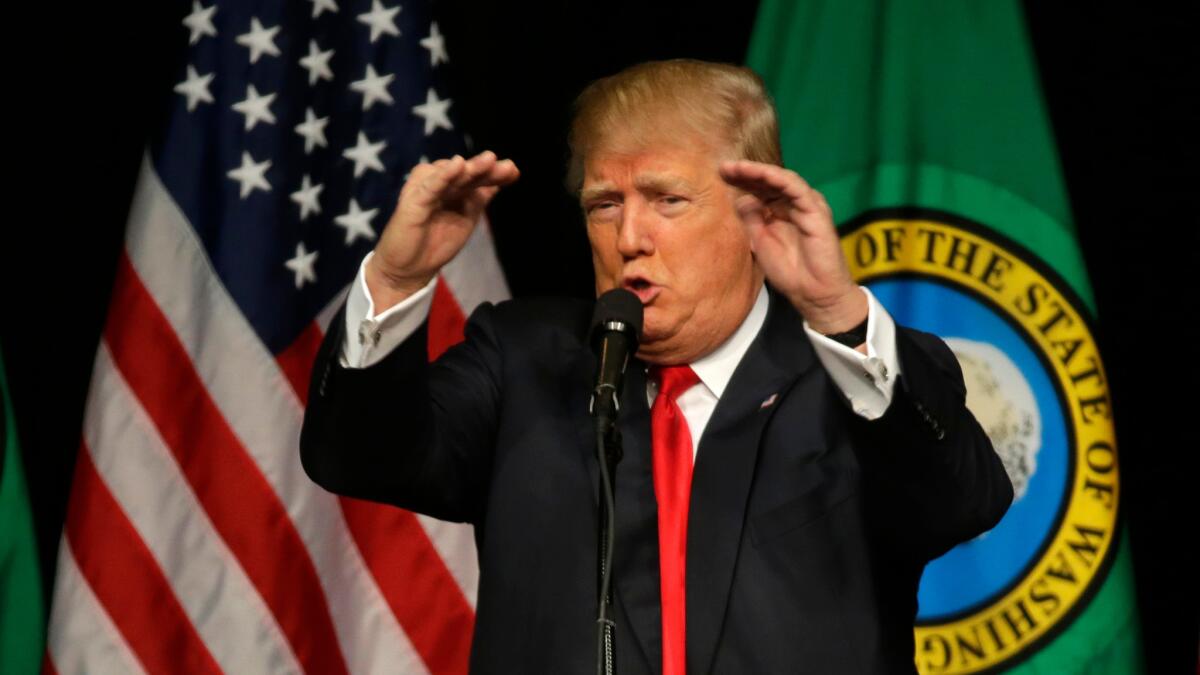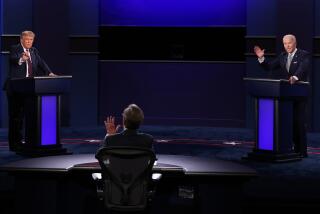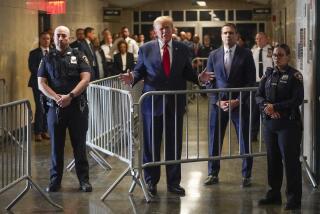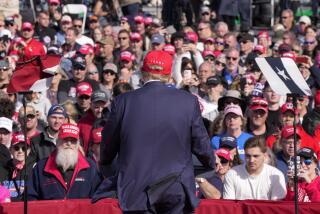Column: How brazenly can a candidate lie and get away with it? We’re going to find out with Donald Trump

Republican presidential candidate Donald Trump speaks during a rally in Spokane, Wash. on May 7.
All politicians bend the truth. All politicians spin the facts. But Donald Trump is mounting an audacious experiment in mendacity: How brazenly can a candidate lie and get away with it?
Consider the bizarre (and, in any other context, comical) events of last week.
The Washington Post published a 1991 audiotape with the voice of a man who sounded uncannily like Trump — but he identified himself as “John Miller,” a Trump spokesman. In the recording, Miller told People magazine that Trump, newly divorced, was fending off a surfeit of girlfriends (not counting Madonna, in whom Miller said Trump had “zero interest”).
When the 2016 candidate was asked about the 1991 tape, his denial was absolute.
“It was not me on the phone,” he told NBC. Not only that, “I don’t know anything about it. You’re telling me about it for the first time.”
Yet, back in 1991, Trump admitted it was him on the phone. People printed his apology back then for what he called a joke that went awry. And that wasn’t Trump’s first brush with pseudonymity. In a 1990 court case, he testified under oath that he also made phone calls under the name of “John Barron,” the Post reported.
A trivial controversy? Not really, because it fits into a rich pattern of whoppers and falsehoods — often followed by equally bogus denials.
Trump fibs so often that the fact-checking website Politifact awarded him its 2015 “Lie of the Year” award for his entire body of work, a lifetime achievement award for prevarication.
He’s lied about small things and large.
He’s lied so many times that some of his falsehoods are famous in their own right: His assertion that he watched Muslims cheer as the World Trade Center collapsed, his charge that the Mexican government deliberately sends criminals across the U.S. border.
Bizarrely, he has lied about statements that are easy to check. In January, he denied a report that he had called for a 45% tariff on imports from China. “It’s The New York Times; they’re always wrong,” he said. The Times published the tape; “Forty-five percent,” Trump said.
In March, when asked if he would reject the support of former Ku Klux Klan leader David Duke, Trump said: “I just don’t know anything about him.” That was nonsense; in 2000, Trump publicly denounced Duke as a racist.
On foreign policy, Trump says he’d be a better president than Hillary Clinton because he opposed the 2003 invasion of Iraq and the 2011 war in Libya. But that’s not true: Trump publicly supported those wars before they started.
Even when he’s not exactly lying, Trump often shows little regard for consistency. His claims about his economic proposals — the heart of his bid for the presidency — make no sense at all.
If there are undecided voters out there, fact-checking could help them decide not to vote for Trump (although it wouldn’t guarantee that they’d vote for Clinton).
Trump has called for a gigantic tax cut that would reduce federal revenue by an estimated $10 trillion over 10 years. His campaign says the tax cut would produce an economic boom, generate $7 trillion in new revenue, and wipe out the federal deficit.
He doesn’t seem to have noticed that $7 trillion (the new revenue) is smaller than $10 trillion (the added deficit, piled atop the existing deficit).
Will any of this matter?
It’s true that Trump’s likely Democratic opponent has had problems with credibility too. Some polls suggest that voters consider Trump the least honest candidate in the race, but others give that honor to Hillary Clinton.
Still, say what you like about Clinton, she plays by traditional rules. She doesn’t deny her past statements when they’re on tape.
It’s also true that media fact-checking exposes (like this one) don’t always work. Political scientists have long noted that partisan voters are hard to shake from their allegiances, no matter what the facts. They call it “motivated reasoning,” the tendency of people to disbelieve arguments that challenge their beliefs (Democrats practice it as well as Republicans).
Brendan Nyhan of Dartmouth College has even found that fact-checking makes some voters more committed to their candidate, not less — a phenomenon he calls the “backfire effect.”
But Trump’s cost-free dissembling may be coming to an end, Nyhan told me via email. “It didn’t hurt him in the Republican primary race, but he’s heading into the general election with the worst favorable/unfavorable ratings ever.”
If there are undecided voters out there, he said, fact-checking could help them decide not to vote for Trump (although it wouldn’t guarantee that they’d vote for Clinton).
The question, he added, is how much fact-checking the media will do from here on out.
“It’s unclear how much critical news coverage Trump’s falsehoods will attract. To what extent is it even considered news when he says something inaccurate at this point?”
This campaign will be a test of Trump’s own advice from his 1987 bestseller — and it really was a bestseller, no lie — “The Art of the Deal”:
“You can’t con people, at least not for long. You can create excitement, you can do wonderful promotion and get all kinds of press, and you can throw in a little hyperbole. But if you don’t deliver the goods, people will eventually catch on.”
Twitter: @DoyleMcManus
Follow the Opinion section on Twitter @latimesopinion and Facebook
More to Read
A cure for the common opinion
Get thought-provoking perspectives with our weekly newsletter.
You may occasionally receive promotional content from the Los Angeles Times.







